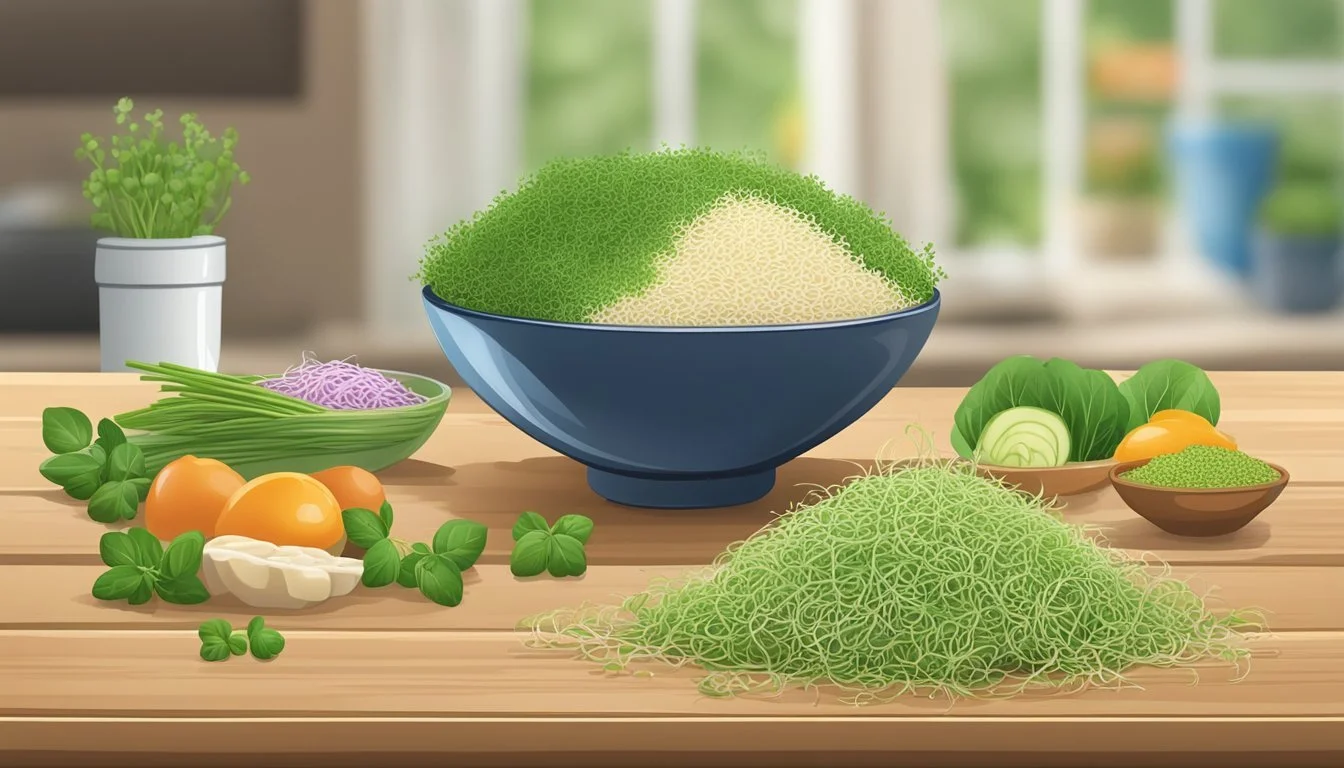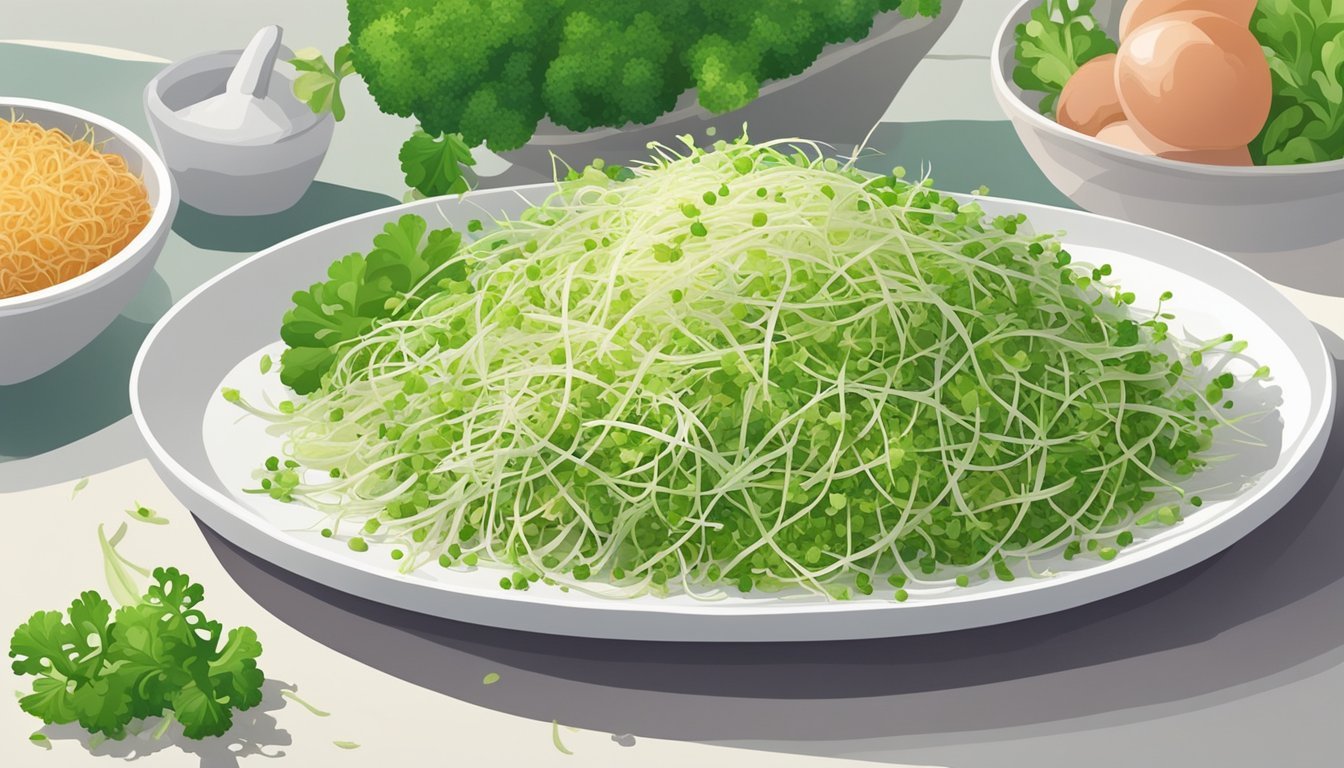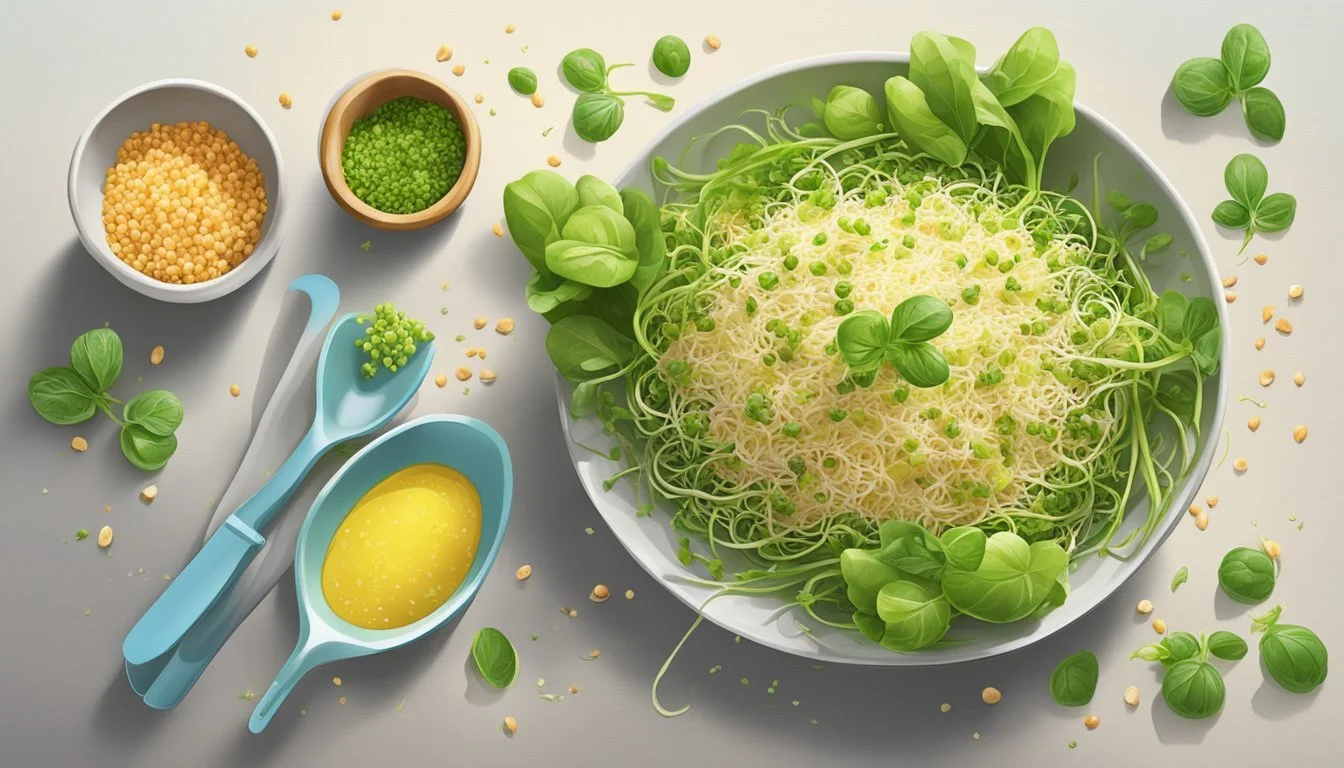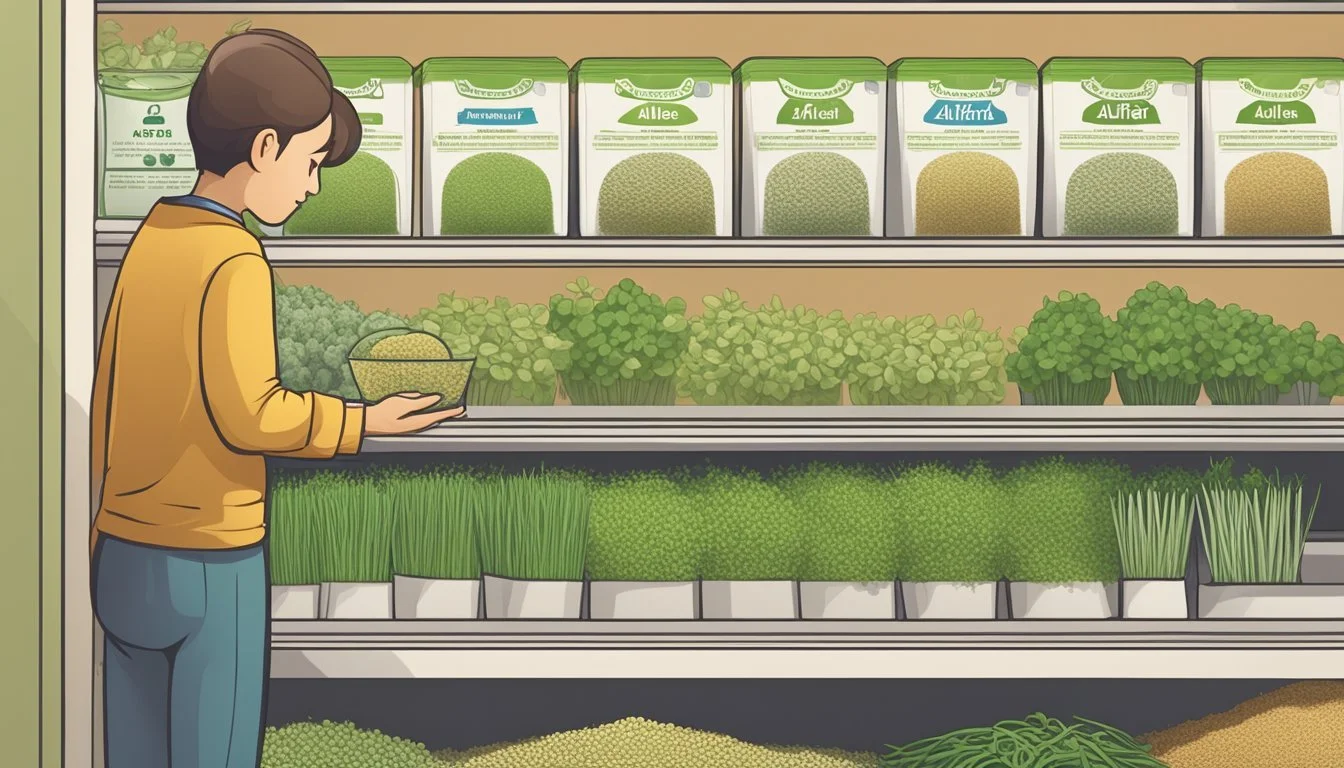Alfalfa Sprouts Substitutes
Top Alternatives for Your Recipes
Alfalfa sprouts, known for their mild taste and crunchy texture, are a popular addition to salads, sandwiches, and various healthy dishes. If you're looking for substitutes for alfalfa sprouts, there are several options that provide similar qualities and nutritional benefits. Among the top choices are mung bean sprouts, lentil sprouts, and radish sprouts, all of which offer their own unique flavors and textures while fitting seamlessly into recipes that call for alfalfa sprouts.
Mung bean sprouts, for instance, have a slightly sweet flavor and a satisfying crunch, making them an excellent alternative. Lentil sprouts bring a nutty taste to your dishes, along with a crunchy texture, ideal for adding depth to salads or wraps. Radish sprouts offer a bit of a spicy kick, adding an extra layer of flavor while maintaining the desirable crunch.
For those who prefer non-sprout alternatives, shredded cabbage or Napa cabbage can bulk up salads and mimic the texture of alfalfa sprouts. Sunflower seeds, though not a direct substitute, can be added for a nutty flavor and additional texture. These substitutes ensure you won't miss out on the delightful crunch and nutritional benefits that alfalfa sprouts bring to the table.
Nutritional Profile of Alfalfa Sprouts
Alfalfa sprouts are a low-calorie food packed with various nutrients. They contain protein, fiber, vitamins, and minerals essential for promoting health.
Vitamins and Minerals
Alfalfa sprouts are rich in vitamins such as vitamin C and vitamin K. They contain essential minerals like calcium, iron, magnesium, and potassium.
Vitamin C: Supports immune function and skin health.
Vitamin K: Important for blood clotting and bone health.
Calcium and Magnesium: Crucial for bone strength.
Iron: Vital for red blood cell production and oxygen transport.
These nutrients contribute significantly to the overall nutritional value of alfalfa sprouts.
Health Benefits
Consumption of alfalfa sprouts offers numerous health benefits. They contain antioxidants that help reduce oxidative stress and inflammation.
Protein: Aids in muscle repair and growth.
Fiber: Improves digestive health and promotes regular bowel movements.
Phytoestrogens: May help balance hormone levels in the body.
These sprouts can support metabolic functions, enhance nutritional benefits, and potentially reduce the risk of certain chronic diseases.
Safety Concerns
While alfalfa sprouts are nutritious, they pose some safety concerns. They have been linked to outbreaks of foodborne illnesses such as Listeria and Salmonella.
Proper Handling: Rinse thoroughly and store in a cool place.
Raw Consumption: Consider avoiding raw sprouts if you have a compromised immune system.
Awareness of these risks helps ensure the safe consumption of alfalfa sprouts while enjoying their nutritional benefits.
Culinary Uses of Alfalfa Sprouts
Alfalfa sprouts are versatile ingredients often used to enhance the texture and flavor of various dishes. Their delicate, crunchy nature and mild, nutty taste make them suitable for salads, sandwiches, and Asian cuisine.
Common Dishes
Alfalfa sprouts are commonly used in fresh salads, adding a light and refreshing crunch. They are often paired with vegetables like tomatoes, cucumbers, and carrots. Sprouts also frequently appear in sandwiches, providing a crisp texture that complements ingredients like avocado, grilled chicken, and cheese.
In Asian cuisine, alfalfa sprouts are used in dishes such as Pad Thai and spring rolls. They feature prominently in wraps and other raw dishes, where their freshness can be most appreciated.
Importance of Texture and Flavor
The texture of alfalfa sprouts is vital to their culinary appeal. Their crunchiness adds a pleasing contrast to other components of a dish, which might be softer or chewier. This makes them an excellent topping for a variety of foods.
In terms of flavor, alfalfa sprouts have a mild, nutty taste with a hint of bitterness. This subtle flavor makes them versatile, as they can blend well without overpowering the overall taste of the dish. Alfalfa sprouts are often used to balance stronger flavors or to add a fresh element.
Preparation and Cooking Tips
To maintain the fresh, crunchy texture of alfalfa sprouts, it is best to use them raw. Rinse the sprouts thoroughly under cold water to remove any debris before adding them to your dish. Keep them refrigerated to preserve their crispness and prevent wilting.
They can be lightly tossed in dressings or incorporated at the last moment to maintain their texture. If adding to a hot dish, such as a stir-fry or soup, introduce them in the final moments of cooking to keep them from becoming soggy.
Substitute Options for Alfalfa Sprouts
When alfalfa sprouts are unavailable, a range of alternatives can be used to achieve similar textures and flavors. These substitutes can seamlessly fit into salads, sandwiches, and various recipes, providing versatility and culinary flexibility.
Bean Sprouts and Varieties
Mung Bean Sprouts: These are one of the closest substitutes for alfalfa sprouts. They share a similar appearance and fresh crunch. Mung bean sprouts' delicate flavor makes them a versatile ingredient in a variety of dishes, from salads to stir-fries.
Soybean Sprouts: These are another excellent substitute, offering a slightly nuttier flavor and a more robust texture. They can be used in soups, salads, and as a garnish.
Enoki Mushrooms: Although not a sprout, enoki mushrooms can provide a similar texture. Their long, thin stems and mild flavor make them a good alternative in salads and Asian-inspired dishes.
Sprouts with Distinctive Tastes
Radish Sprouts: They provide a more peppery flavor compared to alfalfa sprouts. The distinct taste adds a refreshing bite to salads and sandwiches.
Broccoli Sprouts: These sprouts offer a slightly bitter and peppery flavor. Rich in nutrients, they can enhance the taste of any dish while providing health benefits.
Lentil Sprouts: With their earthy and slightly nutty flavor, lentil sprouts can substitute for alfalfa sprouts in many recipes. They offer a different texture but still add a crunch.
Alternative Greens and Vegetables
Cabbage (Green or Napa): Shredded cabbage, especially napa cabbage, mimics the texture of alfalfa sprouts. It adds bulk and a subtle crunch to salads and wraps.
Bok Choy: Finely sliced bok choy can replace the crunch of alfalfa sprouts. Its mild flavor works well in numerous dishes, from stir-fries to fresh salads.
Lettuce: Varieties like butterhead or romaine can be used, especially when finely shredded. They add a refreshing, crisp texture to various recipes.
Non-Sprout Substitutes
Sunflower Seeds: These seeds add a nutty flavor and crunch to dishes. Sprouted sunflower seeds can also be used for a fresher taste.
Shredded Carrot: This offers sweetness and crunch. It's especially useful for adding color and texture to salads and wraps.
Bamboo Shoots: With a crunchy texture, bamboo shoots can mimic the mouthfeel of alfalfa sprouts. They are versatile and can be used in a wide range of dishes.
Snow Peas: Thinly sliced snow peas add a crisp texture and slightly sweet flavor, making them a suitable alternative in salads and stir-fries.
Incorporating Substitutes in Different Cuisines
Substituting bean sprouts with alternatives like alfalfa sprouts, soybean sprouts, and other vegetables can enhance various dishes by adding a unique texture and flavor. Discover ways to incorporate these substitutes into Asian-inspired dishes and Western meal additions, while also considering healthy and dietary considerations.
Asian-Inspired Dishes
Alfalfa sprouts and soybean sprouts are excellent alternatives in Asian cuisine. They can be used to replace bean sprouts in popular dishes like pad thai, stir-fries, and noodle dishes.
Soybean sprouts are typically cooked and can provide a similar crunchy texture to bean sprouts in stir-fries and soups. They blend well with the bold flavors often found in Asian cooking, such as soy sauce and sesame oil.
Alfalfa sprouts, while milder, can add a refreshing crunch to salads and cold noodle dishes. Their delicate texture is particularly well-suited for dishes that are not heavily cooked. Adding them to a bowl of pho or a fresh spring roll can offer a pleasant contrast to the other ingredients.
Western Meal Additions
In Western cuisine, substitutes like alfalfa sprouts can replace bean sprouts in salads, sandwiches, and wraps. They offer a crunchy texture and mild flavor that complements other fresh ingredients.
For salads, they can be mixed with greens like spinach, kale, or arugula to create a nutrient-packed meal. They are also a popular choice for enhancing the texture and nutritional profile of sandwiches and wraps.
Using sunflower sprouts or mung bean sprouts can also add a slightly nutty taste to these dishes. These sprouts are versatile and can be easily incorporated into various recipes without overpowering the main flavors.
Healthy and Dietary Considerations
When considering dietary needs, substitutes like alfalfa sprouts and soybean sprouts are excellent choices. Alfalfa sprouts are low in calories and packed with vitamins such as Vitamin K and Vitamin C. They are ideal for those seeking a healthy, gluten-free, and low-calorie option.
Soybean sprouts provide a good source of protein and are rich in folate, making them suitable for vegetarian and vegan diets. These sprouts help maintain a balanced diet while adding essential nutrients.
Choosing sprouts that align with specific dietary needs allows for healthier meals without compromising on taste and texture. Whether for a salad, soup, or sandwich, these substitutes help create delicious and nutritious dishes.
Growing and Storage Tips
Growing alfalfa sprouts at home is simple and rewarding, requiring minimal space and resources. Proper storage techniques can extend their shelf life and maintain freshness.
Home Cultivation of Sprouts
To grow alfalfa sprouts at home, start with high-quality seeds. Rinse the seeds under cold water, then soak them in a jar of water for 4-6 hours.
After soaking, drain the seeds and spread them evenly in a sprouting jar or a shallow tray. Place the jar or tray in a location with indirect sunlight. It's essential to rinse and drain the seeds twice daily with clean water. This routine prevents mold growth and ensures proper hydration.
Within 5-7 days, the alfalfa sprouts will be ready for harvest. Larger sprouts can offer a tender, nutty flavor. Use clean hands and equipment during the process to maintain hygiene.
Maximizing Shelf Life and Freshness
Storing alfalfa sprouts properly starts with ensuring they are thoroughly dry before refrigerating. Excess water can lead to spoilage.
Use a paper towel or a clean cloth to gently pat the sprouts dry. Place the dried sprouts in an airtight container lined with a paper towel to absorb excess moisture. Store the container in the refrigerator.
Temperatures around 32-34°F are ideal for preserving freshness. Avoid storing in the crisper drawer, as it's often too humid. Check the sprouts daily and discard any that show signs of spoilage, such as a slimy texture or an off smell. Proper handling can extend their shelf life by up to a week.
Shopping Guide for Sprouts and Substitutes
When shopping for alfalfa sprouts and their substitutes, it's critical to focus on freshness and quality. Additionally, identifying suitable alternatives in supermarkets can help when alfalfa sprouts are difficult to find.
Identifying Quality Sprouts
Inspect the sprouts' appearance. Fresh alfalfa sprouts should be vibrant green and crisp with no signs of wilting or yellowing. The stems should be firm, and there should be no sliminess.
Odor is a crucial indicator. Fresh sprouts should have a neutral or slightly nutty smell. Avoid those with any sour or off-putting odors.
Purchase from reputable sources. Supermarkets with high turnover rates for fresh produce typically offer better quality. Organic options often provide better taste and nutritional value.
Finding Substitutes in Supermarkets
Mung bean sprouts are a popular and readily available substitute. They share a similar crunch and can be found in the produce section of most supermarkets.
Radish sprouts and lentil sprouts also make good alternatives. They offer different flavors but provide the same texture and nutritional benefits.
Shredded cabbage and bamboo shoots can mimic the texture of alfalfa sprouts when used in salads or spring rolls. Look for fresh varieties in the produce aisle or pre-packaged options.
When these options are unavailable, consider using sunflower sprouts or snow peas for a comparable crunch. They can usually be found near specialty greens or health food sections.
Cost Considerations and Bulk Buying
When considering substitutes for alfalfa sprouts, price and purchasing methods significantly impact overall cost efficiency. Comparing prices and leveraging bulk buying can lead to substantial savings.
Comparing Prices of Sprouts and Substitutes
Different sprouts vary in cost due to factors like growing conditions and market demand. For example, mung bean sprouts and lentil sprouts are relatively affordable. They often retail at lower prices compared to rarer options like radish sprouts.
Here's a brief comparison of typical prices per pound:
Sprout Type Price Range (per lb) Alfalfa Sprouts $2.50 - $3.50 Mung Bean Sprouts $1.50 - $2.50 Lentil Sprouts $2.00 - $3.00 Radish Sprouts $3.00 - $4.00
When choosing a substitute, it's essential to balance cost and availability to ensure they meet budgetary constraints.
Economies of Scale in Purchasing
Purchasing seeds or sprouts in bulk offers significant cost reductions. Bulk buying reduces the per-unit cost, making it an economical choice for frequent users. For example, a pound of alfalfa seeds purchased in bulk is more cost-effective than smaller quantities, saving up to 20-30%.
Example: Bulk Buying Savings
Small Quantity (100g): $3.00
Bulk (1kg): $20.00 (saves $5.00)
Additionally, maintaining multiple jars of sprouts simultaneously can ensure a continuous supply, further optimizing costs. Buyers should consider storage to prevent spoilage, which can negate the benefits of bulk purchases.
Understanding these aspects helps in making informed purchasing decisions, striking a balance between cost and convenience.









